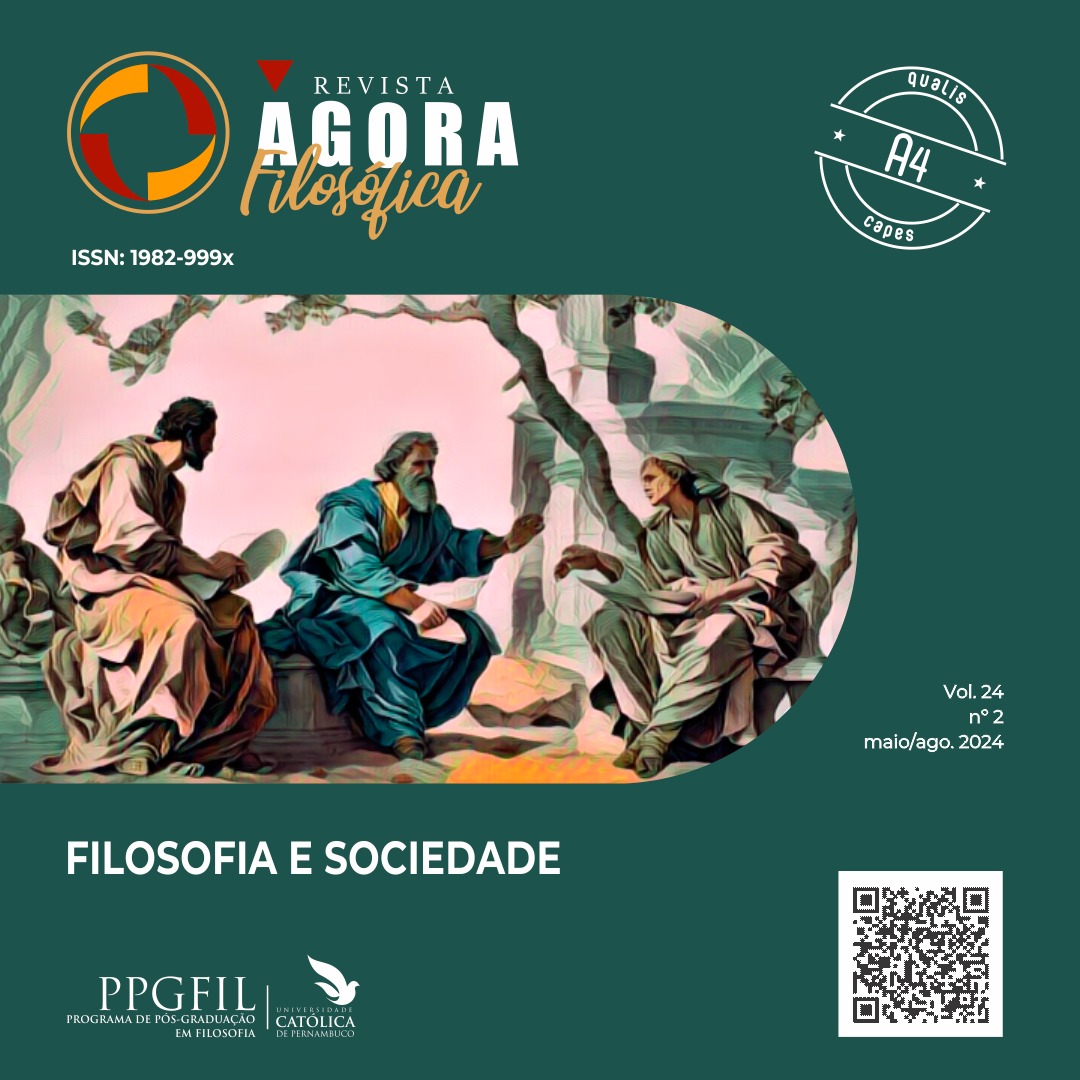Some notes on the relationship between Adorno and the Southern Epistemology
DOI:
https://doi.org/10.25247/P1982-999X.2024.v24n2.p225-248Keywords:
Southern Epistemology, Adorno, Colonialism, Culture Industry, ModernityAbstract
This paper aims to develop an understanding of how the culture industry still operates in the postcolonial era. To this end, the first part of this paper will look at Adorno and Horkheimer’s reading of modernity, touching on how instrumental reasoning can lend itself to barbarism, along with an exposition of Adorno’s analysis of the culture industry. The second part will present decolonial theory, its critique of European modernity and, particularly, its focus on neo-imperialism. This theory will then be put alongside critical theory, analyzing their differences concerning racial issues and how their critique of capitalism may represent a meeting point between the two theories. Finally, the conclusion will consider all previous elements to explain the connection between the Culture industry and its current strategy in former colonial areas.
Downloads
References
ADORNO, T. Progresso. Tradução: G. Cohn. Lua Nova: Revista de Cultura e Política, v. 27, p. 217–236, 1992.
ADORNO, T. Minima moralia. New York: Verso, 2005.
ADORNO, T. Why still philosophy? Critical models: interventions and Catchwords. Columbia: University Press, Sep 14, 2005b.
ADORNO, T. History and freedom: lectures 1964-1965. Trans. R. Tiedemann. New York: Polity Press, 2006.
ADORNO, T. Dialética negativa. Rio de Janeiro: Jorge Zahar, 2009.
ADORNO, T.; Horkheimer, M. Dialectic of enlightenment: philosophical fragments.1. ed. Trans. Gunzelin Schmid Noerr. Redwood City: Stanford University Press, 2002.
AGUIAR, J. Por um marxismo decolonial: contribuições para a reflexão sociológica contemporânea. Revista Observatorio Latinoamericano y Caribeño, n. 2, 2018.
ALLEN, A. The end of progress: decolonizing the normative foundations of critical theory. Columbia University Press, 2015.
ASPRELLA, E.; SCHULZ, J. Colonialidad del saber, epistemologías del sur y pensamiento decolonial: crisis y oportunidades en la configuración de un nuevo orden mundial. Cuadernos de la Facultad de Humanidades y Ciencias Sociales. Universidad Nacional de Jujuy, n. 57, p. 177-196, 2020.
BAUM, B. Decolonizing critical theory. Constellations, v. 22, n. 3, p. 420–434, 2015. https://doi.org/10.1111/1467-8675.12169
BELLESTRIN, L. Imperialismo como Imperialidade: o elo perdido do giro decolonial. In: 38º Encontro Anual da ANPOCS, Caxambu, 2014. Disponível em: www.anpocs.com/index.php/papers-38-encontro/gt-1/gt26-1/9346-imperialismo-como-imperialidade-o-elo-perdido-do-giro-decolonial/Mle.
BERNARDINO-COSTA, J.; GROSFOGUEL, R. Decolonialidade e perspectiva negra. Sociedade e Estado, São Paulo, v. 31, n. 1, p. 15-24, 2016.
BIDASECA, K.; MENESES, M. P. Introdução: as Epistemologias Do Sul Como Expressão De Lutas Epistemológicas E Ontológicas. In: BIDASECA, K.; MENESES, M. P. (org.). Epistemologías del Sur. Buenos Aires: CLACSO, 2018.
BUCK-MORSS, S. Thinking past terror: Islamism and critical theory on the left. Verso, 2016.
DEMIROVIĆ, Alex. What Does It Mean to Speak of the Actuality of Critical Theory?. ACME: An International E-Journal for Critical Geographies, v. 12, n. 2, p. 366-379, 2013.
FANON, F. The wretched of the earth. Trans. R. Philcox. New York: Grove Press, 2005.
FRASER, N. Expropriation and exploitation in racialized capitalism: a reply to michael dawson. Critical Historical Studies, v. 3, n. 1, p. 163–178, 2016. https://doi.org/10.1086/685814
GROSFOGUEL, R. Para descolonizar os estudos de economia política e os estudos pós-coloniais: transmodernidade, pensamento de fronteira e colonialidade global. Revista Crítica de Ciências Sociais, n. 80, p. 115–147, 2008.
HABERMAS, Jürgen. “Bemerkungen zu Beginn einer Vorlesung”. In: HABERMAS, Jürgen. Die Neue Unübersichtlichkeit. Frankfurt am Main, 1983.
HORKHEIMER, M. Critical theory: selected essays. Continuum, 1995.
INGRAM, James. Teoria crítica e pós-colonialismo. Tradução: Mariana Fidelis e Simone Fernandes. Dissonância: Revista de Teoria Crítica, Campinas, v. 4, p. 399–435, 2020.
JARMIN, G. Dialética negativa e o pensamento decolonial. Revista Sures, n. 10, p. 1-14, 2017.
KANE, Cheikh Hamidou. L’aventure ambiguë. Paris: Julliard, 1971.
MCARTHUR, Jan. Critical theory in a decolonial age. Educational philosophy and theory, 2021.
MIGNOLO, Walter D. Coloniality of power and de-colonial thinking. Cultural Studies, v. 21, n. 2–3, p. 155–167, 2007a.
MIGNOLO, Walter D. Habitar la frontera: sentir y pensar la descolonialidad (Antología 1999–2014). Barcelona: CIDOB, 2015.
MIGNOLO, Walter D.; WALSH, Catherine E. Ondecoloniality: concepts, analytics, praxis. Duke University Press, 2018.
NARAYAN, Y. On Biocoloniality and ‘Respectability’ in Contemporary London. Cultural Studies, v. 29, n. 2, p. 185–204, 2015.
PORTELLA, Elizabeth. Adorno’s “Natural History” and Anti-Colonial Critique: Critical Theory and Afro-Caribbean Marxism. Dissonância: Revista de Teoria Crítica, v. 4, Campinas, 2020, p. 162–202.
QUIJANO, Aníbal. Colonialidad y modernidad-racionalidad. In: BONILLA, H. (org.). Los conquistados: 1492 y la población indígena de las Américas. Bogotá: Tercer Mundo, 1992. p. 437–449.
QUIJANO, Aníbal. Colonialidad del poder, cultura y conocimiento en América Latina. Dispositio, Quito, v. 24, n. 51, p. 137-148, 1999.
QUIJANO, Aníbal. Colonialidade do poder, eurocentrismo e América Latina. In: LANDER, E. (org.). A colonialidade do saber: eurocentrismo e ciências sociais, perspectivas latino-americanas. Buenos Aires: CLACSO, 2005.
RODNEY, W. How. Europe snderdeveloped Africa. New York: Verso, 1981.
SAID, Edward W. Orientalismo: o Oriente como invenção do Ocidente. São Paulo: Companhia das Letras, 1990.
SANTOS, B. de Sousa. Epistemologies of the South. Justice against Epistemicide. Abingdon: Routledge, 2014.
SANTOS, B. de Sousa. O fim do império cognitivo: a Afirmação das Epistemologias do sul. São Paulo: Autêntica, 2019.
SEGATO, Rita Laura. Raça é signo. Brasília: Série Antropologia 372, 2005.
SPIVAK, G. C. Subaltern studies: deconstructing historiography. In: GUHA, R.; SPIVAK, G. C. (Ed.). Selected Studies. New York: Oxford University Press, p. 3-32.
WALLERSTEIN, Immanuel. World-systems analysis. London: Durham, 2004.
WEBER, Max. The protestant ethic and the spirit of capitalism. Trans. Talcott Parsons. London, 1930.
WEHELIYE, A. G. Habeas viscus: racializing assemblages, biopolitics, and black feminist theories of the human. Duke University Press, 2014.
WHYMAN, T. Understanding Adorno on ‘Natural-History’. International Journal of Philosophical Studies, v. 24, n. 4, p. 452–472, 2016.
WIREDU, K. Conceptual decolonization as an imperative in contemporary African philosophy: some personal reflections. Rue Descartes, n. 36, p. 53-64, 2002.
WOOD, E. O império do capital. Tradução: P. Castanheira. São Paulo: Boitempo, 2014.
Downloads
Published
Issue
Section
License
Copyright (c) 2024 Gustavo Ruiz da Silva, Daniel Lopes Prado Matheus

This work is licensed under a Creative Commons Attribution 4.0 International License.
You are free to:
- Share — copy and redistribute the material in any medium or format for any purpose, even commercially.
- Adapt — remix, transform, and build upon the material for any purpose, even commercially.
- The licensor cannot revoke these freedoms as long as you follow the license terms.
Under the following terms:
- Attribution — You must give appropriate credit , provide a link to the license, and indicate if changes were made . You may do so in any reasonable manner, but not in any way that suggests the licensor endorses you or your use.
- No additional restrictions — You may not apply legal terms or technological measures that legally restrict others from doing anything the license permits.
Notices:
You do not have to comply with the license for elements of the material in the public domain or where your use is permitted by an applicable exception or limitation .
No warranties are given. The license may not give you all of the permissions necessary for your intended use. For example, other rights such as publicity, privacy, or moral rights may limit how you use the material.
















